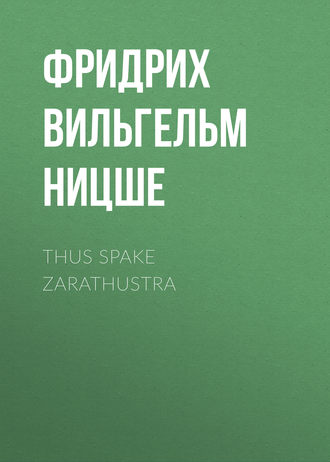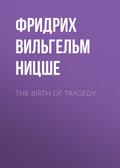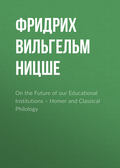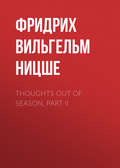
Фридрих Вильгельм Ницше
Thus Spake Zarathustra
XLI. THE SOOTHSAYER
“ – And I saw a great sadness come over mankind. The best turned weary of their works.
A doctrine appeared, a faith ran beside it: ‘All is empty, all is alike, all hath been!’
And from all hills there re-echoed: ‘All is empty, all is alike, all hath been!’
To be sure we have harvested: but why have all our fruits become rotten and brown? What was it fell last night from the evil moon?
In vain was all our labour, poison hath our wine become, the evil eye hath singed yellow our fields and hearts.
Arid have we all become; and fire falling upon us, then do we turn dust like ashes: – yea, the fire itself have we made aweary.
All our fountains have dried up, even the sea hath receded. All the ground trieth to gape, but the depth will not swallow!
‘Alas! where is there still a sea in which one could be drowned?’ so soundeth our plaint – across shallow swamps.
Verily, even for dying have we become too weary; now do we keep awake and live on – in sepulchres.”
Thus did Zarathustra hear a soothsayer speak; and the foreboding touched his heart and transformed him. Sorrowfully did he go about and wearily; and he became like unto those of whom the soothsayer had spoken. —
Verily, said he unto his disciples, a little while, and there cometh the long twilight. Alas, how shall I preserve my light through it!
That it may not smother in this sorrowfulness! To remoter worlds shall it be a light, and also to remotest nights!
Thus did Zarathustra go about grieved in his heart, and for three days he did not take any meat or drink: he had no rest, and lost his speech. At last it came to pass that he fell into a deep sleep. His disciples, however, sat around him in long night-watches, and waited anxiously to see if he would awake, and speak again, and recover from his affliction.
And this is the discourse that Zarathustra spake when he awoke; his voice, however, came unto his disciples as from afar:
Hear, I pray you, the dream that I dreamed, my friends, and help me to divine its meaning!
A riddle is it still unto me, this dream; the meaning is hidden in it and encaged, and doth not yet fly above it on free pinions.
All life had I renounced, so I dreamed. Night-watchman and grave-guardian had I become, aloft, in the lone mountain-fortress of Death.
There did I guard his coffins: full stood the musty vaults of those trophies of victory. Out of glass coffins did vanquished life gaze upon me.
The odour of dust-covered eternities did I breathe: sultry and dust-covered lay my soul. And who could have aired his soul there!
Brightness of midnight was ever around me; lonesomeness cowered beside her; and as a third, death-rattle stillness, the worst of my female friends.
Keys did I carry, the rustiest of all keys; and I knew how to open with them the most creaking of all gates.
Like a bitterly angry croaking ran the sound through the long corridors when the leaves of the gate opened: ungraciously did this bird cry, unwillingly was it awakened.
But more frightful even, and more heart-strangling was it, when it again became silent and still all around, and I alone sat in that malignant silence.
Thus did time pass with me, and slip by, if time there still was: what do I know thereof! But at last there happened that which awoke me.
Thrice did there peal peals at the gate like thunders, thrice did the vaults resound and howl again: then did I go to the gate.
Alpa! cried I, who carrieth his ashes unto the mountain? Alpa! Alpa! who carrieth his ashes unto the mountain?
And I pressed the key, and pulled at the gate, and exerted myself. But not a finger’s-breadth was it yet open:
Then did a roaring wind tear the folds apart: whistling, whizzing, and piercing, it threw unto me a black coffin.
And in the roaring, and whistling, and whizzing the coffin burst up, and spouted out a thousand peals of laughter.
And a thousand caricatures of children, angels, owls, fools, and child-sized butterflies laughed and mocked, and roared at me.
Fearfully was I terrified thereby: it prostrated me. And I cried with horror as I ne’er cried before.
But mine own crying awoke me: – and I came to myself. —
Thus did Zarathustra relate his dream, and then was silent: for as yet he knew not the interpretation thereof. But the disciple whom he loved most arose quickly, seized Zarathustra’s hand, and said:
“Thy life itself interpreteth unto us this dream, O Zarathustra!
Art thou not thyself the wind with shrill whistling, which bursteth open the gates of the fortress of Death?
Art thou not thyself the coffin full of many-hued malices and angel-caricatures of life?
Verily, like a thousand peals of children’s laughter cometh Zarathustra into all sepulchres, laughing at those night-watchmen and grave-guardians, and whoever else rattleth with sinister keys.
With thy laughter wilt thou frighten and prostrate them: fainting and recovering will demonstrate thy power over them.
And when the long twilight cometh and the mortal weariness, even then wilt thou not disappear from our firmament, thou advocate of life!
New stars hast thou made us see, and new nocturnal glories: verily, laughter itself hast thou spread out over us like a many-hued canopy.
Now will children’s laughter ever from coffins flow; now will a strong wind ever come victoriously unto all mortal weariness: of this thou art thyself the pledge and the prophet!
Verily, THEY THEMSELVES DIDST THOU DREAM, thine enemies: that was thy sorest dream.
But as thou awokest from them and camest to thyself, so shall they awaken from themselves – and come unto thee!”
Thus spake the disciple; and all the others then thronged around Zarathustra, grasped him by the hands, and tried to persuade him to leave his bed and his sadness, and return unto them. Zarathustra, however, sat upright on his couch, with an absent look. Like one returning from long foreign sojourn did he look on his disciples, and examined their features; but still he knew them not. When, however, they raised him, and set him upon his feet, behold, all on a sudden his eye changed; he understood everything that had happened, stroked his beard, and said with a strong voice:
“Well! this hath just its time; but see to it, my disciples, that we have a good repast; and without delay! Thus do I mean to make amends for bad dreams!
The soothsayer, however, shall eat and drink at my side: and verily, I will yet show him a sea in which he can drown himself!” —
Thus spake Zarathustra. Then did he gaze long into the face of the disciple who had been the dream-interpreter, and shook his head. —
XLII. REDEMPTION
When Zarathustra went one day over the great bridge, then did the cripples and beggars surround him, and a hunchback spake thus unto him:
“Behold, Zarathustra! Even the people learn from thee, and acquire faith in thy teaching: but for them to believe fully in thee, one thing is still needful – thou must first of all convince us cripples! Here hast thou now a fine selection, and verily, an opportunity with more than one forelock! The blind canst thou heal, and make the lame run; and from him who hath too much behind, couldst thou well, also, take away a little; – that, I think, would be the right method to make the cripples believe in Zarathustra!”
Zarathustra, however, answered thus unto him who so spake: When one taketh his hump from the hunchback, then doth one take from him his spirit – so do the people teach. And when one giveth the blind man eyes, then doth he see too many bad things on the earth: so that he curseth him who healed him. He, however, who maketh the lame man run, inflicteth upon him the greatest injury; for hardly can he run, when his vices run away with him – so do the people teach concerning cripples. And why should not Zarathustra also learn from the people, when the people learn from Zarathustra?
It is, however, the smallest thing unto me since I have been amongst men, to see one person lacking an eye, another an ear, and a third a leg, and that others have lost the tongue, or the nose, or the head.
I see and have seen worse things, and divers things so hideous, that I should neither like to speak of all matters, nor even keep silent about some of them: namely, men who lack everything, except that they have too much of one thing – men who are nothing more than a big eye, or a big mouth, or a big belly, or something else big, – reversed cripples, I call such men.
And when I came out of my solitude, and for the first time passed over this bridge, then I could not trust mine eyes, but looked again and again, and said at last: “That is an ear! An ear as big as a man!” I looked still more attentively – and actually there did move under the ear something that was pitiably small and poor and slim. And in truth this immense ear was perched on a small thin stalk – the stalk, however, was a man! A person putting a glass to his eyes, could even recognise further a small envious countenance, and also that a bloated soullet dangled at the stalk. The people told me, however, that the big ear was not only a man, but a great man, a genius. But I never believed in the people when they spake of great men – and I hold to my belief that it was a reversed cripple, who had too little of everything, and too much of one thing.
When Zarathustra had spoken thus unto the hunchback, and unto those of whom the hunchback was the mouthpiece and advocate, then did he turn to his disciples in profound dejection, and said:
Verily, my friends, I walk amongst men as amongst the fragments and limbs of human beings!
This is the terrible thing to mine eye, that I find man broken up, and scattered about, as on a battle- and butcher-ground.
And when mine eye fleeth from the present to the bygone, it findeth ever the same: fragments and limbs and fearful chances – but no men!
The present and the bygone upon earth – ah! my friends – that is MY most unbearable trouble; and I should not know how to live, if I were not a seer of what is to come.
A seer, a purposer, a creator, a future itself, and a bridge to the future – and alas! also as it were a cripple on this bridge: all that is Zarathustra.
And ye also asked yourselves often: “Who is Zarathustra to us? What shall he be called by us?” And like me, did ye give yourselves questions for answers.
Is he a promiser? Or a fulfiller? A conqueror? Or an inheritor? A harvest? Or a ploughshare? A physician? Or a healed one?
Is he a poet? Or a genuine one? An emancipator? Or a subjugator? A good one? Or an evil one?
I walk amongst men as the fragments of the future: that future which I contemplate.
And it is all my poetisation and aspiration to compose and collect into unity what is fragment and riddle and fearful chance.
And how could I endure to be a man, if man were not also the composer, and riddle-reader, and redeemer of chance!
To redeem what is past, and to transform every “It was” into “Thus would I have it!” – that only do I call redemption!
Will – so is the emancipator and joy-bringer called: thus have I taught you, my friends! But now learn this likewise: the Will itself is still a prisoner.
Willing emancipateth: but what is that called which still putteth the emancipator in chains?
“It was”: thus is the Will’s teeth-gnashing and lonesomest tribulation called. Impotent towards what hath been done – it is a malicious spectator of all that is past.
Not backward can the Will will; that it cannot break time and time’s desire – that is the Will’s lonesomest tribulation.
Willing emancipateth: what doth Willing itself devise in order to get free from its tribulation and mock at its prison?
Ah, a fool becometh every prisoner! Foolishly delivereth itself also the imprisoned Will.
That time doth not run backward – that is its animosity: “That which was”: so is the stone which it cannot roll called.
And thus doth it roll stones out of animosity and ill-humour, and taketh revenge on whatever doth not, like it, feel rage and ill-humour.
Thus did the Will, the emancipator, become a torturer; and on all that is capable of suffering it taketh revenge, because it cannot go backward.
This, yea, this alone is REVENGE itself: the Will’s antipathy to time, and its “It was.”
Verily, a great folly dwelleth in our Will; and it became a curse unto all humanity, that this folly acquired spirit!
THE SPIRIT OF REVENGE: my friends, that hath hitherto been man’s best contemplation; and where there was suffering, it was claimed there was always penalty.
“Penalty,” so calleth itself revenge. With a lying word it feigneth a good conscience.
And because in the willer himself there is suffering, because he cannot will backwards – thus was Willing itself, and all life, claimed – to be penalty!
And then did cloud after cloud roll over the spirit, until at last madness preached: “Everything perisheth, therefore everything deserveth to perish!”
“And this itself is justice, the law of time – that he must devour his children:” thus did madness preach.
“Morally are things ordered according to justice and penalty. Oh, where is there deliverance from the flux of things and from the ‘existence’ of penalty?” Thus did madness preach.
“Can there be deliverance when there is eternal justice? Alas, unrollable is the stone, ‘It was’: eternal must also be all penalties!” Thus did madness preach.
“No deed can be annihilated: how could it be undone by the penalty! This, this is what is eternal in the ‘existence’ of penalty, that existence also must be eternally recurring deed and guilt!
Unless the Will should at last deliver itself, and Willing become non-Willing – :” but ye know, my brethren, this fabulous song of madness!
Away from those fabulous songs did I lead you when I taught you: “The Will is a creator.”
All “It was” is a fragment, a riddle, a fearful chance – until the creating Will saith thereto: “But thus would I have it.” —
Until the creating Will saith thereto: “But thus do I will it! Thus shall I will it!”
But did it ever speak thus? And when doth this take place? Hath the Will been unharnessed from its own folly?
Hath the Will become its own deliverer and joy-bringer? Hath it unlearned the spirit of revenge and all teeth-gnashing?
And who hath taught it reconciliation with time, and something higher than all reconciliation?
Something higher than all reconciliation must the Will will which is the Will to Power – : but how doth that take place? Who hath taught it also to will backwards?
– But at this point in his discourse it chanced that Zarathustra suddenly paused, and looked like a person in the greatest alarm. With terror in his eyes did he gaze on his disciples; his glances pierced as with arrows their thoughts and arrear-thoughts. But after a brief space he again laughed, and said soothedly:
“It is difficult to live amongst men, because silence is so difficult – especially for a babbler.” —
Thus spake Zarathustra. The hunchback, however, had listened to the conversation and had covered his face during the time; but when he heard Zarathustra laugh, he looked up with curiosity, and said slowly:
“But why doth Zarathustra speak otherwise unto us than unto his disciples?”
Zarathustra answered: “What is there to be wondered at! With hunchbacks one may well speak in a hunchbacked way!”
“Very good,” said the hunchback; “and with pupils one may well tell tales out of school.
But why doth Zarathustra speak otherwise unto his pupils – than unto himself?” —
XLIII. MANLY PRUDENCE
Not the height, it is the declivity that is terrible!
The declivity, where the gaze shooteth DOWNWARDS, and the hand graspeth UPWARDS. There doth the heart become giddy through its double will.
Ah, friends, do ye divine also my heart’s double will?
This, this is MY declivity and my danger, that my gaze shooteth towards the summit, and my hand would fain clutch and lean – on the depth!
To man clingeth my will; with chains do I bind myself to man, because I am pulled upwards to the Superman: for thither doth mine other will tend.
And THEREFORE do I live blindly among men, as if I knew them not: that my hand may not entirely lose belief in firmness.
I know not you men: this gloom and consolation is often spread around me.
I sit at the gateway for every rogue, and ask: Who wisheth to deceive me?
This is my first manly prudence, that I allow myself to be deceived, so as not to be on my guard against deceivers.
Ah, if I were on my guard against man, how could man be an anchor to my ball! Too easily would I be pulled upwards and away!
This providence is over my fate, that I have to be without foresight.
And he who would not languish amongst men, must learn to drink out of all glasses; and he who would keep clean amongst men, must know how to wash himself even with dirty water.
And thus spake I often to myself for consolation: “Courage! Cheer up! old heart! An unhappiness hath failed to befall thee: enjoy that as thy – happiness!”
This, however, is mine other manly prudence: I am more forbearing to the VAIN than to the proud.
Is not wounded vanity the mother of all tragedies? Where, however, pride is wounded, there there groweth up something better than pride.
That life may be fair to behold, its game must be well played; for that purpose, however, it needeth good actors.
Good actors have I found all the vain ones: they play, and wish people to be fond of beholding them – all their spirit is in this wish.
They represent themselves, they invent themselves; in their neighbourhood I like to look upon life – it cureth of melancholy.
Therefore am I forbearing to the vain, because they are the physicians of my melancholy, and keep me attached to man as to a drama.
And further, who conceiveth the full depth of the modesty of the vain man! I am favourable to him, and sympathetic on account of his modesty.
From you would he learn his belief in himself; he feedeth upon your glances, he eateth praise out of your hands.
Your lies doth he even believe when you lie favourably about him: for in its depths sigheth his heart: “What am I?”
And if that be the true virtue which is unconscious of itself – well, the vain man is unconscious of his modesty! —
This is, however, my third manly prudence: I am not put out of conceit with the WICKED by your timorousness.
I am happy to see the marvels the warm sun hatcheth: tigers and palms and rattle-snakes.
Also amongst men there is a beautiful brood of the warm sun, and much that is marvellous in the wicked.
In truth, as your wisest did not seem to me so very wise, so found I also human wickedness below the fame of it.
And oft did I ask with a shake of the head: Why still rattle, ye rattle-snakes?
Verily, there is still a future even for evil! And the warmest south is still undiscovered by man.
How many things are now called the worst wickedness, which are only twelve feet broad and three months long! Some day, however, will greater dragons come into the world.
For that the Superman may not lack his dragon, the superdragon that is worthy of him, there must still much warm sun glow on moist virgin forests!
Out of your wild cats must tigers have evolved, and out of your poison-toads, crocodiles: for the good hunter shall have a good hunt!
And verily, ye good and just! In you there is much to be laughed at, and especially your fear of what hath hitherto been called “the devil!”
So alien are ye in your souls to what is great, that to you the Superman would be FRIGHTFUL in his goodness!
And ye wise and knowing ones, ye would flee from the solar-glow of the wisdom in which the Superman joyfully batheth his nakedness!
Ye highest men who have come within my ken! this is my doubt of you, and my secret laughter: I suspect ye would call my Superman – a devil!
Ah, I became tired of those highest and best ones: from their “height” did I long to be up, out, and away to the Superman!
A horror came over me when I saw those best ones naked: then there grew for me the pinions to soar away into distant futures.
Into more distant futures, into more southern souths than ever artist dreamed of: thither, where Gods are ashamed of all clothes!
But disguised do I want to see YOU, ye neighbours and fellowmen, and well-attired and vain and estimable, as “the good and just;” —
And disguised will I myself sit amongst you – that I may MISTAKE you and myself: for that is my last manly prudence. —
Thus spake Zarathustra.







